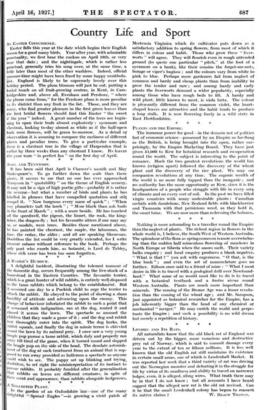PLANTS AND THE Esu'IaE.
The immense power for good—in the domain not of politics but of economic science—possessed by an Empire so fur-flung as the British, is being brought into the open, rather sur- prisingly, by the Empire Marketing Board. They have just given 24,000 to Kew for botanical research and co-operation round the world. The subject is interesting to the point of romance. Much the two greatest revolutions the world has known (religion apart) followed the discovery of the wheat plant and the discovery of the rice plant. We may see companion revolutions at any time. The organic wealth of the world is no more fully tapped than the inorganic ; and no authority has the same opportunity as Kew, since it is the headquarters of a people who struggle with life in every sort of climate and on every sort of soil. In the past we have filled virgin countries with many undesirable plants : Canadian orchids with dandelions, New Zealand fields with blackberries and Tasmania with that pernicious weed, as they hold it, the sweet briar. We are now more than redressing the balance.
Nothing is more astounding to a traveller round the Empire than the neglect of plants. The richest region in flowers in the whole world is, I believe, the South West of Western Australia. The splendour of the flora as spring comeson is more overwhelm- ing than the sudden half miraculous flowering of meadows in North Europe or Siberia when the snows melt. Their variety balks enquiry ; and local enquiry produces a blank negative. " What is that ? " you ask with eagerneess. " 0 that, is the blue bush " ; and even the art of nomenclature goes no further. Edison once said to a friend of mine : " What I most desire in life is to travel with a geological drill over Newfound-. land." What some of us would most like to do is to travel with a botanical textbook and a horlus siccus round Western Australia. Plants are much more important than minerals. The coming of the Bronze Age was a lesser revolu- tion than the coming of the wheat age ; and Mr. Sampson, just appointed as botanical researcher for the Empire, has a job inherently bigger than the head of any chemical or mechanical " merger." He May enrich the world and perpe- tuate the Empire ; and such a possibility is no wild dream but merely a repetition of history.
* * * *


































 Previous page
Previous page